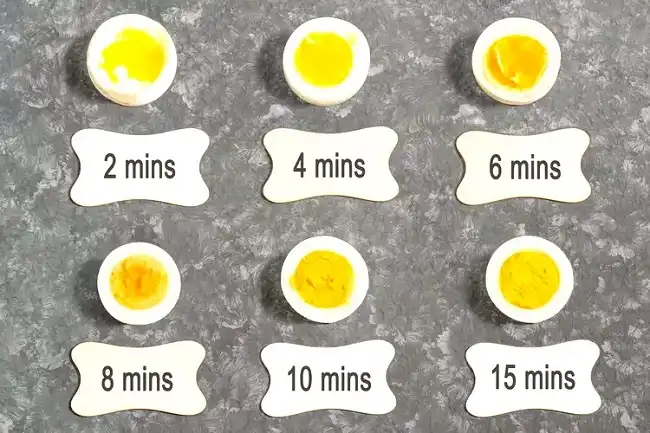There’s something magical about a perfectly boiled egg. The whites are firm but tender, and the yolks are cooked yet creamy—a simple, satisfying delight. Whether you’re making deviled eggs, egg salad, or just enjoying them with a sprinkle of salt, achieving that perfect boil is easier than you might think.
In this guide, we’ll share a foolproof stovetop method, alternative cooking techniques, and some pro tips for getting the yolks just the way you like them.
The Secret to Perfect Boiled Eggs
To get flawless boiled eggs every time, it helps to understand one key detail: the age of your eggs matters. Very fresh eggs are fantastic for frying or scrambling, but when it comes to boiling, older eggs peel more easily. For hard-boiled eggs that practically slide out of their shells, choose eggs that have been in your fridge for about a week or two.
The Foolproof Stovetop Method
Step 1: Start with Cold Water
Place your eggs in a saucepan or pot and cover them with cold water. Starting with cold water prevents the eggs from cracking and ensures even cooking. If you add eggs to boiling water, they’re more likely to crack on impact.
Step 2: Bring to a Boil, Then Remove from Heat
Set the pot over high heat and bring the water to a rolling boil. Once it’s boiling, remove the pot from the heat and cover it with a lid. This technique avoids overcooking, which can result in rubbery whites and green-tinged yolks.
Step 3: Time Your Eggs
The cooking time depends on how you like your yolks:
- Soft-boiled (runny yolks): Let the eggs sit in the hot water for 2 to 4 minutes.
- Medium-boiled (soft but set yolks): 6 to 8 minutes.
- Hard-boiled (fully set yolks): 10 to 15 minutes.
Smaller eggs will cook faster, while jumbo eggs may need a little extra time.
Step 4: Ice Bath
Once your timer goes off, drain the hot water and transfer the eggs to a bowl filled with ice water. This step stops the cooking process immediately and makes peeling a breeze. For best results, crack the eggs slightly before placing them in the ice bath and let them sit for about an hour.

Oven-Baked “Boiled” Eggs
If your stovetop is crowded or you’re making eggs in bulk, try baking them in the oven. Preheat your oven to 325°F (163°C) and place the eggs in a muffin tin to keep them from rolling around. Bake for 25 to 30 minutes. This method doesn’t require water, making it more of a “hard-baking” than “hard-boiling” process, but the results are just as delicious.
Pressure Cooker Perfection
Fresh eggs can be notoriously tricky to peel, but a pressure cooker changes the game. Place a cup of water in your pressure cooker, set the eggs on a trivet, and cook at high pressure for 5 minutes. Let the pressure release naturally for 5 minutes before transferring the eggs to an ice bath. Not only does this method cook eggs to perfection, but it also makes even the freshest eggs easy to peel.
Storing Boiled Eggs
To keep your hard-boiled eggs fresh:
- Store them in their shells in a covered container in the refrigerator for up to one week. The shell acts as a barrier, keeping odors out.
- If you’ve already peeled them, place them in an airtight container with a damp paper towel. Refresh the towel daily to maintain moisture.
Delicious Ways to Enjoy Boiled Eggs
Boiled eggs are versatile and can be used in countless dishes:
- Egg Salad: Mash them with mayonnaise, mustard, and your favorite seasonings.
- Deviled Eggs: Slice them in half, scoop out the yolks, and mix with spices before piping the mixture back in.
- Pickled Eggs: Submerge them in a tangy brine for a unique snack.
- Soups and Salads: Slice them into ramen bowls or chop them over leafy greens.
- Sandwiches: Layer them into club sandwiches or pair with avocado for a healthy toast topping.
Tips for Success
- Green Yolks? This happens when eggs are overcooked. The green ring is a harmless chemical reaction between sulfur in the whites and iron in the yolks. Avoid this by following the proper timing and using an ice bath.
- Peeling Made Easy: Slightly crack the shell before putting the eggs in ice water. This helps water seep under the membrane, loosening the shell.
- Don’t Waste Leftovers: Boiled eggs last up to a week in the fridge. Use them as snacks, salad toppers, or sandwich fillers throughout the week.
With these tips and methods, you’ll never have to worry about undercooked or overcooked eggs again. Perfect boiled eggs are just a pot of water away!

